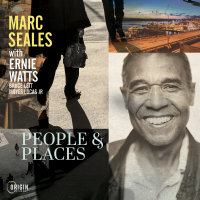Home » Jazz Articles » From Far and Wide » Back to Brazil: Part Two
Back to Brazil: Part Two
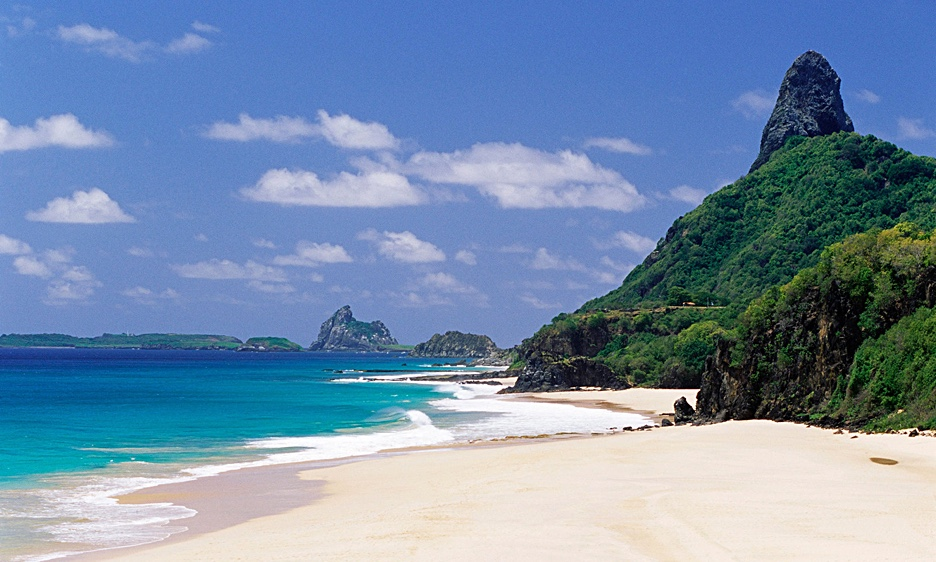
The mixture of Bossa and Bebop created yet another sub-genre of Brazilian music, and today the still virile Samba Jazz movement is enjoying a resurgence.
Part Two of this series on recent Brazilian-influenced releases continues with further discussion of the Samba Jazz genre. The style's heyday, from the early to mid-1960s, produced what Brazilian music critics consider to be landmark recordings. The early champions of the instrumental and more jazz-oriented version of Bossa Nova included such pioneers as pianist Sедrgio Mendes and his Bossa Rio Septet; baritone saxophonist

Moacir Santos
composer / conductor1926 - 2006

Antonio Adolfo
pianob.1947

Raul De Souza
tromboneb.1934

Roberto Menescal
guitarb.1937
 Samba Jazz & Tom Jobim (Sunnyside) is headlined by three Brazilian jazz stars of recent years —drummer
Samba Jazz & Tom Jobim (Sunnyside) is headlined by three Brazilian jazz stars of recent years —drummer 
Duduka Da Fonseca
drums
Maucha Adnet
vocals
Helio Alves
pianob.1966

Romero Lubambo
guitarb.1955

Hans Glawischnig
bassb.1970

Billy Drewes
saxophone
Claudio Roditi
trumpet1946 - 2020

Wynton Marsalis
trumpetb.1961
The set opens with a rhythmically vivacious version of trumpeter Roditi's composition "Gemini Man," with Da Fonseca delivering what is all but an A-to-Z lesson in Samba Jazz drumming. He adds further rhythmic details in his own composition, "Alana." Saxophonist Drews is an interesting choice to cover the horn slot. On soprano in particular, he delivers svelte, sinuous lines that complement pianist Alves' rhythmically dense and melodically alluring solos, as on the ballad "Untitled"—a break from the supercharged Samba Jazz mode. Lubambo provides his usual technically stunning guitar work, while singer Maucha Adnet adds her viscerally attractive, emotion-shaded vocals—a study in barely restrained sensuality. She shines on works like Jobim's lilting "A Correnteza" and on his seldom recorded "Vocе║ Vai Ver." The inclusion of Jobim's "Polo Pony," a rarity unknown to most Jobim fans, provides a session highlight, as does Wynton Marsalis' solo on one of the Samba Jazz genre's standards, trombonist Raul De Souza's "A Vontade Mesmo."
While the performances on Samba Jazz & Tom Jobim cannot be faulted, the album's thrown together graphics and photos strike a dissonant chord. A recording this importance deserves a visual identity that equals the distinctiveness of the music; sadly, on this session, that was not the case.
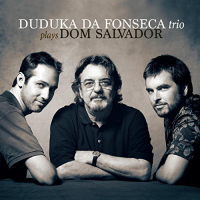 Quite the opposite is the situation on drummer Da Fonseca's trio tribute to a key member of the original Samba Jazz generation, pianist
Quite the opposite is the situation on drummer Da Fonseca's trio tribute to a key member of the original Samba Jazz generation, pianist 
Dom Salvador
pianoThe recording is also a winner, showcasing the not-so-well-known repertoire of Salvador, whose trio, along with the Tamba Trio, Sambalan?o Trio, Zimbo Trio and many others, was one of the key participants in the 1960s era Samba Jazz movement in Brazil. The opening track, "Farjuto," provides a good stylistic overview of what's to come on 11 performances—a relentless, rustling Samba Jazz pulse driven by drummer Da Fonseca and bassist Guto Wirtti, coupled with virtuosic playing and melodies bursting with dramatic expression and catchy hooks. Pianist

David Feldman
pianob.1977

Vince Guaraldi
piano1928 - 1976
 Live! Ao Vivo! spotlights the many talents of Quarteto Moderno, a New York City ensemble led by guitarist and composer "
data-original-title="" title="">Richard Boukas. A proud Greek American who became obsessed with Brazilian styles early in his music career, Boukas is a well-known educator and string master. On this 10-track, self-released date, captured live at a New School concert, he surveys folk-rooted idioms from Brazil's Northeast—the same fertile cultural realm that has inspired some of the best work by Edu Lobo, Sivuca and
Live! Ao Vivo! spotlights the many talents of Quarteto Moderno, a New York City ensemble led by guitarist and composer "
data-original-title="" title="">Richard Boukas. A proud Greek American who became obsessed with Brazilian styles early in his music career, Boukas is a well-known educator and string master. On this 10-track, self-released date, captured live at a New School concert, he surveys folk-rooted idioms from Brazil's Northeast—the same fertile cultural realm that has inspired some of the best work by Edu Lobo, Sivuca and 
Hermeto Pascoal
multi-instrumentalist1936 - 2025

Mauricio Zottarelli
drumsb.1975
 Another release that is saturated with the rhythms of Northeast Brazil is Hermeto: Voice and Wind (Sunnyside), led by vibraphone and marimba artist
Another release that is saturated with the rhythms of Northeast Brazil is Hermeto: Voice and Wind (Sunnyside), led by vibraphone and marimba artist 
Erik Charlston
vibraphone
Egberto Gismonti
guitarb.1947
Charlston's meticulous arranging concepts avoid straightforward appropriation of the base rhythms initially employed by Pascoal and the other composers represented here. He leaves plenty of open spaces for marimba ostinatos and the reverent tone of Nash's clarinet and flute work. The intertwining of the leader's shimmering vibraphone line and Soskin's relaxed pianistics on the ballad reading of Hermeto's "Os Guizos" (The Jingles) underscore the session's expressive breadth.
Brazil's Biscoito Fino has become the symbol of excellence in that country's recording industry—a label that works studiously to ensure that every release is an undeniable work of art, from the photography and packaging choice of artists and repertoire. A kind of Latin American ECM, Biscoito Fino takes seriously its role in documenting the talents of Brazil's most distinguished instrumentalists. But, is the programming too esoteric for North American audiences? You be the judge.
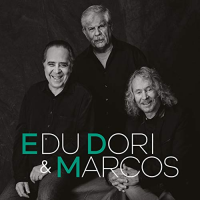 Edu, Dori & Marcos is an example of a successful formula used by the label to spotlight the still vibrant talents of iconic national artists, in this case vocalists and composers Edu Lobo,
Edu, Dori & Marcos is an example of a successful formula used by the label to spotlight the still vibrant talents of iconic national artists, in this case vocalists and composers Edu Lobo, 
Dori Caymmi
guitarb.1943

Marcos Valle
multi-instrumentalistb.1943

Elis Regina
vocalsb.1945
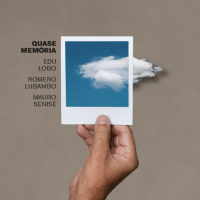 Quase Memе«ria, also on the Biscoito Fino label, features an 11-track program of mostly underexposed works by Edu Lobo. The composer is the date's sole vocalist. Two world class Brazilian jazz artists, woodwind player Mauro Senise and guitarist Romero Lubambo, get deserved equal billing. Such guests as clarinetist Anat Cohen, pianist Cristov?o Bastos, and accordionist Kiko Horta are occasionally showcased. Lobo may not be a full-fledged jazz singer, but he is one of his generation's most intriguing vocalists—a master of phrasing with the kind elasticity and subtle inflections in his delivery that reflect strong jazz sensibilities. "Lебbia" (Lip), a tune Lobo co-authored with Chico Buarque, is notable for Cohen's showstopping solo.
Quase Memе«ria, also on the Biscoito Fino label, features an 11-track program of mostly underexposed works by Edu Lobo. The composer is the date's sole vocalist. Two world class Brazilian jazz artists, woodwind player Mauro Senise and guitarist Romero Lubambo, get deserved equal billing. Such guests as clarinetist Anat Cohen, pianist Cristov?o Bastos, and accordionist Kiko Horta are occasionally showcased. Lobo may not be a full-fledged jazz singer, but he is one of his generation's most intriguing vocalists—a master of phrasing with the kind elasticity and subtle inflections in his delivery that reflect strong jazz sensibilities. "Lебbia" (Lip), a tune Lobo co-authored with Chico Buarque, is notable for Cohen's showstopping solo. 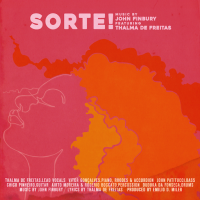

John Finbury
piano
John Patitucci
bassb.1959

Chico Pinheiro
guitar Yet another release that benefits from the presence of drummer Duduka Da Fonseca, A Moment of You (Blue Line), by vocalist and composer
Yet another release that benefits from the presence of drummer Duduka Da Fonseca, A Moment of You (Blue Line), by vocalist and composer 
Daniela Soledade
vocals
Stacey Kent
vocalsb.1968
In the concluding Part Three of this survey, we will consider the merits of new recordings by

Eliane Elias
piano and vocalsb.1960
Tags
Comments
PREVIOUS / NEXT
Support All About Jazz
 All About Jazz has been a pillar of jazz since 1995, championing it as an art form and, more importantly, supporting the musicians who make it. Our enduring commitment has made "AAJ" one of the most culturally important websites of its kind, read by hundreds of thousands of fans, musicians and industry figures every month.
All About Jazz has been a pillar of jazz since 1995, championing it as an art form and, more importantly, supporting the musicians who make it. Our enduring commitment has made "AAJ" one of the most culturally important websites of its kind, read by hundreds of thousands of fans, musicians and industry figures every month.







 Buy Now
Buy Now



